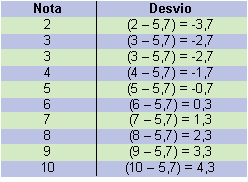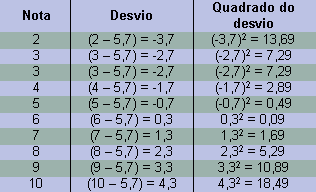Calculate the standard deviation of a vector
I am not able to solve the following equation:
Here is the Code:
#include <stdio.h>
#include <math.h>
int main(){
float m, media, sigma, p;
int vetor[10];
media = 0;
m = 0;
sigma = 0;
p = 0;
for(int i = 0; i < 10; i++){
printf("Digite um número: ");
scanf("%d", &vetor[i]);
}
for(int i = 0; i < 10; i++){
m = m + vetor[i];
}
media = m / 10.0;
for(int i = 0; i < 10; i++){
p = p + (vetor[i] - media);
}
sigma = sqrt((p * 1)/10);
printf("Resultado d = %.2f\n", sigma);
}
3 answers
The standard deviation formula has to have the squared distance, which is not in yours. See this formula taken directly from wikipedia :
Where (xi- x)² is raised to ²
In this formula i starts at 1 and goes to N which corresponds to yours that starts at 0 and goes to N-1, thus not affecting the calculations.
Applying this fix to your code:
int main(){
...
media = m / 10.0;
for(i = 0; i < 10; i++){
p = p + pow(vetor[i] - media,2); //agora quadrado aqui utilizando a função pow
}
sigma = sqrt(p/(10-1)); //dividir por 10-1 que faltava, ou 9 se quiser simplificar
printf("Resultado d = %.2f\n", sigma);
return 0;
}
The formula is wrong. You should take the sum of the variation of the mean squared .
Here is your revised and simplified program:
#include <stdio.h>
#include <math.h>
#define QTD_ELEMENTOS 5
int main() {
int vetor[QTD_ELEMENTOS];
for (int i = 0; i < QTD_ELEMENTOS; i++) {
//printf("Digite um número: ");
scanf("%d", &vetor[i]);
}
int somatorio = 0;
for (int i = 0; i < QTD_ELEMENTOS; i++) {
somatorio += vetor[i];
}
float media = somatorio / (float) QTD_ELEMENTOS;
float variacoes = 0;
for (int i = 0; i < QTD_ELEMENTOS; i++) {
float v = vetor[i] - media;
variacoes += v * v;
}
float sigma = sqrt(variacoes / QTD_ELEMENTOS);
printf("Resultado d = %.2f\n", sigma);
}
See here working on ideone.
Consider the following set containing 10 amostras:
{ 2, 3, 3, 4, 5, 6, 7, 8, 9, 10 }
First of all, we calculate the simple arithmetic mean of the samples of the set:
Next, we calculate the deviation of all these samples from the mean:
Thus, we Square the deviation of each sample from the mean:
With this, we are able to calculate the variance :
Calculate the standard deviation by extracting the square root of the variance:
Follows a code capable of separately calculating the "mean", "variance" and "standard deviation"of a set of values:
#include <stdio.h>
#include <math.h>
#define MAXSIZE 10
double media( double s[], int n )
{
double sum = 0.0;
int i = 0;
for( i = 0; i < n; i++ )
sum += s[i];
return sum / n;
}
double variancia( double s[], int n )
{
double sum = 0.0;
double dev = 0.0;
double med = media( s, n );
int i = 0;
for( i = 0; i < n; i++ )
{
dev = s[i] - med;
sum += (dev * dev);
}
return sum / n;
}
double desvio_padrao( double s[], int n )
{
double v = variancia( s, n );
return sqrt( v );
}
int main( void )
{
double vetor[ MAXSIZE ];
int i;
for( i = 0; i < MAXSIZE; i++ )
{
printf("Digite um numero: ");
scanf( "%lf", &vetor[i] );
}
printf("Media = %g\n", media( vetor, MAXSIZE ) );
printf("Variancia = %g\n", variancia( vetor, MAXSIZE ) );
printf("Desvio Padrao = %g\n", desvio_padrao( vetor, MAXSIZE ) );
return 0;
}
Compiling:
$ gcc -lm desvio.c -o desvio
Heads:
Digite um numero: 2
Digite um numero: 3
Digite um numero: 3
Digite um numero: 4
Digite um numero: 5
Digite um numero: 6
Digite um numero: 7
Digite um numero: 8
Digite um numero: 9
Digite um numero: 10
Media = 5.7
Variancia = 6.81
Desvio Padrao = 2.6096






